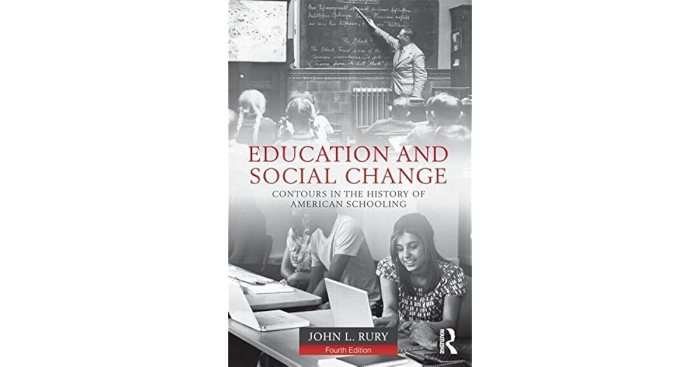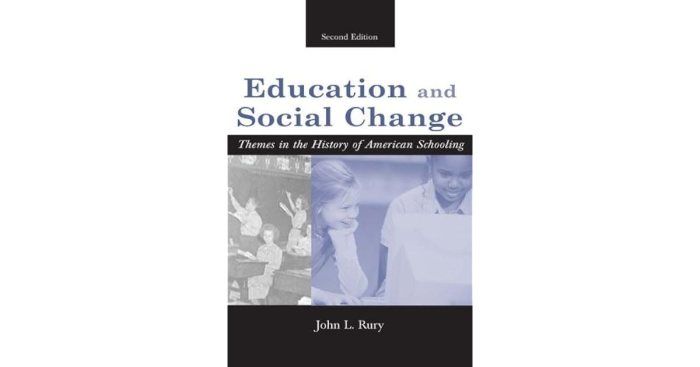Education and social change rury pdf delves into the profound impact of education on rural communities, exploring its transformative power to empower individuals, foster economic development, and drive positive social change. This comprehensive guide offers a nuanced understanding of the challenges and opportunities inherent in improving education in rural areas, providing valuable insights and evidence-based recommendations.
From examining the correlation between education levels and economic growth to highlighting the role of community engagement in supporting rural schools, this publication provides a roadmap for addressing the unique challenges faced by rural education systems. It showcases successful educational programs that have catalyzed social change in rural areas, offering practical examples and case studies that illustrate the transformative potential of education.
Education and Social Change in Rural Areas
Education plays a pivotal role in fostering social change in rural communities. By providing access to knowledge and skills, education empowers individuals, strengthens communities, and contributes to overall social and economic development.
The Impact of Education on Rural Communities
Education has a multifaceted impact on rural communities, including:
- Improved health outcomes: Education enhances health literacy, promoting preventive behaviors and access to healthcare.
- Reduced poverty: Education increases earning potential, creating opportunities for individuals and families to break the cycle of poverty.
- Increased civic participation: Education fosters critical thinking, communication skills, and community engagement.
Challenges and Opportunities for Improving Education in Rural Areas
Improving education in rural areas presents both challenges and opportunities:
- Challenges:Limited access to quality teachers, outdated infrastructure, and transportation difficulties.
- Opportunities:Leveraging technology, implementing innovative teaching methods, and fostering community partnerships.
Successful Educational Programs in Rural Areas
Several successful educational programs have demonstrated the transformative power of education in rural communities:
- Teach for America:A national program that recruits and trains recent college graduates to teach in high-need rural schools.
- Project Based Learning:An approach that engages students in hands-on, community-based learning experiences.
- After-School Programs:Programs that provide academic support, enrichment activities, and mentorship for rural youth.
The Role of Education in Empowering Rural Communities

Education plays a crucial role in empowering rural communities by:
Enhancing Individual Capacity
Education equips individuals with the knowledge, skills, and critical thinking abilities necessary to navigate a complex and changing world.
Fostering Community Leadership
Education provides a platform for developing leadership skills, encouraging individuals to take ownership of their communities and address local challenges.
Promoting Economic Mobility
Education opens up employment opportunities and career paths, allowing individuals to contribute to the local economy and improve their quality of life.
Case Studies of Empowerment through Education
The following case studies illustrate the transformative impact of education on individuals in rural areas:
- Malala Yousafzai:A Pakistani activist who defied Taliban threats to advocate for girls’ education.
- Liz Murray:A homeless teenager who overcame adversity to earn a degree from Harvard University.
- Muhammad Yunus:A Bangladeshi economist and Nobel laureate who founded Grameen Bank, providing microfinance to empower rural women.
Education as a Catalyst for Economic Development in Rural Areas

Education contributes to economic development in rural areas by:
Increasing Human Capital
Education develops a skilled workforce, increasing productivity and attracting businesses to rural areas.
Stimulating Innovation
Education fosters creativity and problem-solving abilities, leading to the development of new products and services.
Attracting and Retaining Businesses
A well-educated workforce and access to educational institutions make rural areas more attractive to businesses seeking a skilled labor pool.
Evidence of the Correlation between Education and Economic Growth
Studies have shown a strong correlation between education levels and economic growth in rural communities:
- A study by the World Bank found that a 1% increase in education attainment in rural areas leads to a 1.5% increase in economic growth.
- A report by the National Governors Association found that rural counties with higher high school graduation rates have higher incomes and lower unemployment rates.
Challenges to Providing Equitable Education in Rural Areas
Providing equitable access to education in rural areas faces several challenges:
Poverty and Limited Resources
Poverty and limited resources often result in inadequate school infrastructure, teacher shortages, and a lack of access to educational materials.
Geographic Isolation
Geographic isolation can make it difficult for students to attend school regularly and access educational opportunities outside their communities.
Cultural Factors
Cultural factors, such as traditional gender roles or negative attitudes towards education, can hinder educational attainment in rural areas.
Innovative Approaches to Addressing Challenges
Innovative approaches to addressing these challenges include:
- Distance Learning:Using technology to provide educational opportunities to students in remote areas.
- Community Schools:Offering a range of services beyond traditional education, such as healthcare, childcare, and job training.
- Culturally Responsive Education:Tailoring educational approaches to the specific needs and values of rural communities.
The Importance of Community Engagement in Rural Education

Community engagement is essential for improving education in rural areas:
Local Knowledge and Support
Community members have valuable insights and can provide support for educational initiatives.
Increased Student Motivation
When communities are involved in education, students feel more connected and motivated to succeed.
Improved School-Community Relationships
Community engagement builds bridges between schools and communities, fostering a sense of shared responsibility.
Examples of Successful Partnerships, Education and social change rury pdf
Examples of successful partnerships between schools and communities include:
- Parent-Teacher Associations:Engaging parents in their children’s education and providing support for teachers.
- Community Advisory Boards:Giving community members a voice in shaping educational decisions.
- After-School Programs:Offering enrichment activities and academic support in partnership with local organizations.
Expert Answers: Education And Social Change Rury Pdf
What are the key challenges to providing equitable education in rural areas?
Poverty, geographic isolation, cultural factors, and lack of resources are among the primary challenges.
How can education contribute to economic development in rural areas?
Education improves human capital, attracts businesses, and fosters innovation, leading to economic growth.
What is the role of community engagement in improving rural education?
Community engagement fosters collaboration, provides support, and ensures that education is aligned with local needs.




